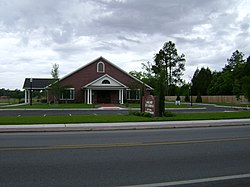Lakeland, Georgia
City in Georgia, United States From Wikipedia, the free encyclopedia
Lakeland is a city and the county seat of Lanier County, Georgia, United States. The city is the county seat of Lanier County.[4] It is part of the Valdosta, Georgia metropolitan statistical area. The population was 2,875 at the 2020 census.[5]
Lakeland, Georgia | |
|---|---|
 Lakeland City Hall and Lakeland Police Department | |
 Location in Lanier County and the state of Georgia | |
| Coordinates: 31°2′21″N 83°4′13″W | |
| Country | United States |
| State | Georgia |
| County | Lanier |
| Area | |
• Total | 3.15 sq mi (8.16 km2) |
| • Land | 3.10 sq mi (8.04 km2) |
| • Water | 0.05 sq mi (0.12 km2) |
| Elevation | 200 ft (61 m) |
| Population (2020) | |
• Total | 2,875 |
| • Density | 926.52/sq mi (357.79/km2) |
| Time zone | UTC-5 (Eastern (EST)) |
| • Summer (DST) | UTC-4 (EDT) |
| ZIP code | 31635 |
| Area code | 229 |
| FIPS code | 13-44592[2] |
| GNIS feature ID | 0356347[3] |
Originally called Alapaha and then Milltown or Mill Town, Lakeland received its current name in 1925 in honor of its proximity to Grand Bay Lake, Lake Irma, and Banks Lake.[6] For many years, Lakeland owned and operated its own railroad.
History
By the late 1830s, a community known as Alapaha had come into existence along the road from Waresboro, Georgia to Troupville, Georgia near the mill established by Joshua Lee on what is now Banks Lake National Wildlife Refuge. In 1838, a post office was established and was officially named Alapaha after the nearby Alapaha River. In 1848, Joshua Lee sold his mill to William Lastinger. In the 1850s, additional mills were established in the area and the population of the community continued to grow. In 1857, Alapaha was renamed Milltown. During the American Civil, William Lastinger sold his mill to Henry Banks.[7] Milltown was incorporated in 1901. In 1919, Milltown was designated seat of the newly formed Lanier County. In 1928, the city was incorporated and renamed to its present form of Lakeland.[8]
Geography
Lakeland is located at 31°2′21″N 83°4′13″W (31.039214, -83.070397).[9]
According to the United States Census Bureau, the city has a total area of 3.1 square miles (8.0 km2), of which 3.1 square miles (8.0 km2) is land and 0.04 square miles (0.10 km2) (1.28%) is water.
Demographics
| Census | Pop. | Note | %± |
|---|---|---|---|
| 1910 | 1,247 | — | |
| 1920 | 860 | −31.0% | |
| 1930 | 1,006 | 17.0% | |
| 1940 | 1,502 | 49.3% | |
| 1950 | 1,551 | 3.3% | |
| 1960 | 2,236 | 44.2% | |
| 1970 | 2,569 | 14.9% | |
| 1980 | 2,647 | 3.0% | |
| 1990 | 2,467 | −6.8% | |
| 2000 | 2,730 | 10.7% | |
| 2010 | 3,366 | 23.3% | |
| 2020 | 2,875 | −14.6% | |
| U.S. Decennial Census[10] 1850-1870[11] 1870-1880[12] 1890-1910[13] 1920-1930[14] 1940[15] 1950[16] 1960[17] 1970[18] 1980[19] 1990[20] 2000[21] 2010[22] | |||
| Race | Num. | Perc. |
|---|---|---|
| White (non-Hispanic) | 1,486 | 51.69% |
| Black or African American (non-Hispanic) | 1,152 | 40.07% |
| Native American | 3 | 0.1% |
| Asian | 26 | 0.9% |
| Pacific Islander | 6 | 0.21% |
| Other/Mixed | 114 | 3.97% |
| Hispanic or Latino | 88 | 3.06% |
As of the 2020 United States census, there were 2,875 people, 997 households, and 631 families residing in the city.
Education
Summarize
Perspective

The Lanier County School District holds grades pre-school to grade twelve, and consists of two elementary schools, a middle school, and a high school.[23] The district has 94 full-time teachers and over 1,345 students.[24]
- Lanier County Primary School
- Lanier County Elementary School
- Lanier County Middle School
- Lanier County High School
The South Georgia Regional Library operates the W. L. Miller Memorial Library in Lakeland. Initially the community was served by a library that was only open during school periods, and therefore people in the community considered it to be a school library rather than a complete community library. This small library opened in the courthouse office of the superintendent of the county school system in 1950. It was relocated to the Lanier County Primary School's Kindergarten building and then to a portion of Lanier County High School. The first standalone library, then the Lanier-Lakeland Library, opened on May 18, 1980. The current facility, built as part of a State of Georgia grant-funded library wave and partially financed by the W. L. Miller family through a $45,000 donation, opened on March 13, 1988. It was renovated from August 9 through August 23 in 2012.[25]
- Lanier County Middle School
- Lanier County Elementary School
- Lanier County Primary School
- W. L. Miller Memorial Library of the South Georgia Regional Library
References
Wikiwand - on
Seamless Wikipedia browsing. On steroids.





